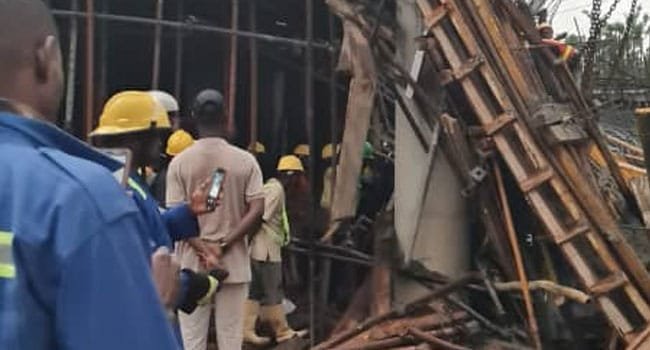The frequency of building collapses in Nigeria has reached an alarming level, with yet another incident recently reported in the Federal Capital Territory (FCT), Abuja. One person narrowly escaped tragedy as a building under construction partially collapsed in the Central Business District, adjacent to Taj Bank.
The disturbing news was shared by Nkechi Isa, the spokesperson for the Federal Capital Territory Emergency Management Agency (FEMA), who revealed that the collapse was reported one hour after unsuccessful attempts by the construction workers to rescue their trapped colleague. The cause of the partial collapse remains shrouded in uncertainty, leaving authorities searching for answers.
In a coordinated effort, a team from FEMA and the FCT fire service managed to rescue the trapped individual with the assistance of specialized extrication equipment and the construction company’s excavator. Tragically, the victim, a laborer involved in casting the building’s first floor, had borne the weight of the entire cast that fell upon him. The survivor is currently undergoing treatment at the National Hospital in Abuja.
The incident serves as a stark reminder of the pervasive risks associated with substandard construction practices in Nigeria. The consistent occurrence of building collapses highlights the urgent need to address safety concerns and enforce stringent adherence to building codes and standards.
Read Also: Mortgage Brokers Inducts New Fellows, Members, Task Them On Housing Deficit
During a visit to the site, Mohammed Sabo, the acting Director-General of FEMA, issued a pointed caution to developers, construction companies, and professionals involved in the construction industry. He emphasized the criticality of prioritizing the safety of workers during the construction phase and ultimately ensuring the protection of future inhabitants.
Sabo urged all stakeholders to eschew the use of substandard materials and to resist the temptation to cut corners in construction processes. The reliance on inferior materials and compromised practices jeopardizes the structural integrity of buildings, posing severe risks to human lives.
The prevalence of building collapses in Nigeria underscores the need for an immediate and concerted effort to address this critical issue. It demands a comprehensive approach that encompasses strict enforcement of building codes and regulations, increased oversight on construction projects, and improved quality control measures. Additionally, awareness campaigns and training initiatives should be implemented to enhance the knowledge and expertise of all individuals involved in the construction industry.
As Nigeria strives for progress and development, it is essential that the safety of its citizens remains a top priority. By working collectively to rectify these shortcomings and bolster safety measures, Nigeria can build a future where lives are protected, and building collapses become an increasingly rare occurrence.























